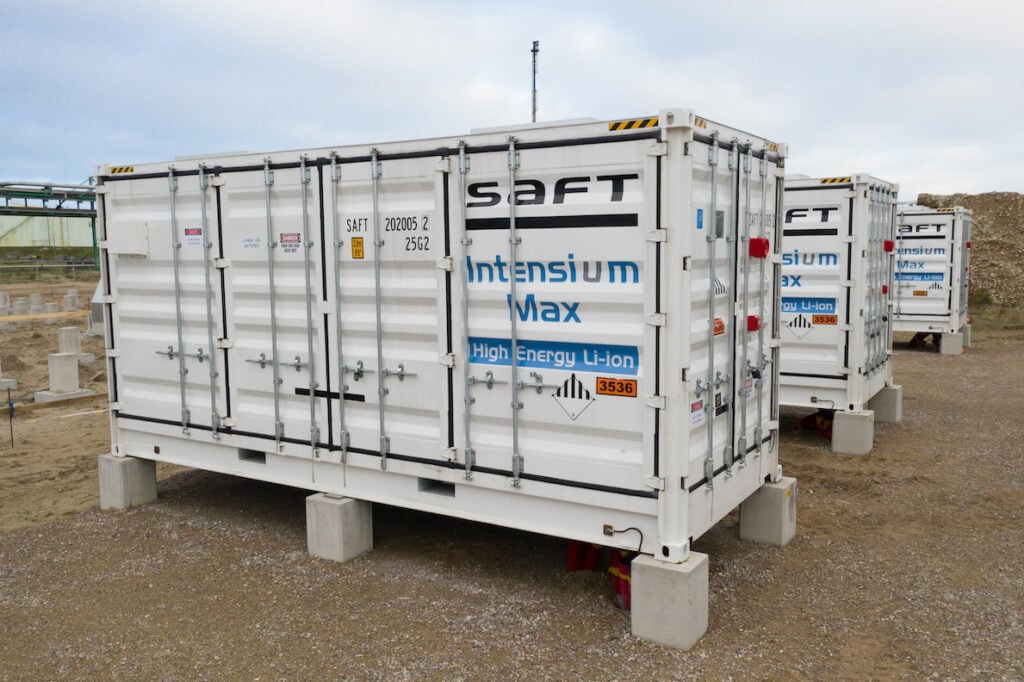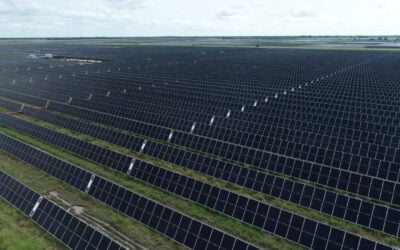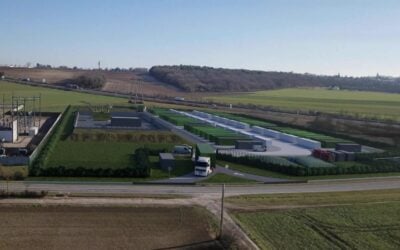
A second installation phase has been completed at TotalEnergies’ battery energy storage facility in Dunkirk, northern France, bringing its output and capacity to 61MW / 61MWh.
The battery energy storage system (BESS) was already France’s biggest system of its type — at 25MW / 25MWh — when it was inaugurated in January 2021.
Enjoy 12 months of exclusive analysis
- Regular insight and analysis of the industry’s biggest developments
- In-depth interviews with the industry’s leading figures
- Annual digital subscription to the PV Tech Power journal
- Discounts on Solar Media’s portfolio of events, in-person and virtual
The project, sited at one of the vertically integrated energy company’s refinery sites in Flandres, Dunkirk, now hosts 27 containerised battery storage systems supplied by Saft, using 2.5MWh units of the energy storage tech provider’s Intensium Max lithium-ion BESS product.
Engineering, procurement and construction (EPC) duties were carried out by electricity generation and distribution services provider Omexom, including civil works and system integration services, connecting the BESS to the extra high voltage transmission grid.
Viewers of two Energy-Storage.news webinars sponsored by Saft have been able to get extra insight into the project, what it does and how it works.
In last week’s webinar ‘How energy storage system operators can benefit from digitalisation,’ Kristin Schumann, deputy director for TotalEnergies’ energy storage solutions team said that France’s transmission system operator RTE awarded the company 103MW of long-term capacity contracts through a tender in early 2020.
TotalEnergies has split this capacity across four sites: two at Dunkirk (25MW / 25MWh and 36MW / 36MWh), one in Carling, near the German border in northeast France (25MW / 25MWh) and another in Grandpuits, north-central France (43MW / 43MWh). While Dunkirk I and Dunkirk II are now in operation, the other two projects are currently in construction and will be completed next year.
All of the projects are located on TotalEnergies refinery sites, benefiting from existing land, grid connections and local operational expertise, Schumann said.
25 data points sent every 10 seconds to transmission operator
The projects provide a combination of ancillary services and capacity market services for RTE, with primary frequency regulation, aka Frequency Containment Reserve (FCR) or Primary Control Reserve (PCR), being the main ancillary grid service.
Schumann explained that TotalEnergies developed and hosts the Dunkirk project, Saft — which TotalEnergies owns — provided and integrated the BESS, Omexom provided EPC and will provide operations and maintenance (O&M) services, while TotalEnergies Flex, the company’s in-house aggregation and trading team, will operate and optimise the batteries’ participation in grid-balancing and capacity markets in direct contact with RTE.
“As these projects are connected directly to the French national grid, and by their sheer size and capacity, we have strict availability requirements. We must be available 24/7 and data must be sent every 10 seconds,” Kristin Schumann said.
That 10-second data sent to the transmission system operator (TSO) includes 25 separate data points such as voltage, frequency and reactive power. Battery system health data points such as State of Health (SoH), State of Charge (SoC), system temperature and battery ageing are also closely monitored.
The system is fully automated and requires very little human monitoring or intervention, which was very important in the project’s design for TotalEnergies’ development team. The collected data must also be reliable and securely stored.
Battery storage deployment has not been as fast in France, or indeed much of mainland Europe, as it has been in markets like the US, UK and latterly Australia. RTE is conducting a pilot project, called Project RINGO, which will see just under 100MWh of battery storage deployed across three French sites that act as virtual transmission assets. Many of France’s island territories overseas have sizeable battery storage systems paired with solar PV plants and the country has pioneer low carbon capacity market auctions since early 2020.
France also shares common frequency regulation markets with much of Europe and some of these, notably the newly-introduced automated Frequency Restoration Reserve (aFRR), are being seen as important revenue streams that could be stacked to further the business case for battery storage in the continent.
Watch our two webinars with Saft, which feature insights on the Dunkirk projects as well as a wealth of information on energy storage system operation and optimisation:
‘How to keep your energy storage system flexible in times of changing market conditions’, from June 2020
and
‘How energy storage system operators can benefit from digitalisation’ from December 2021






